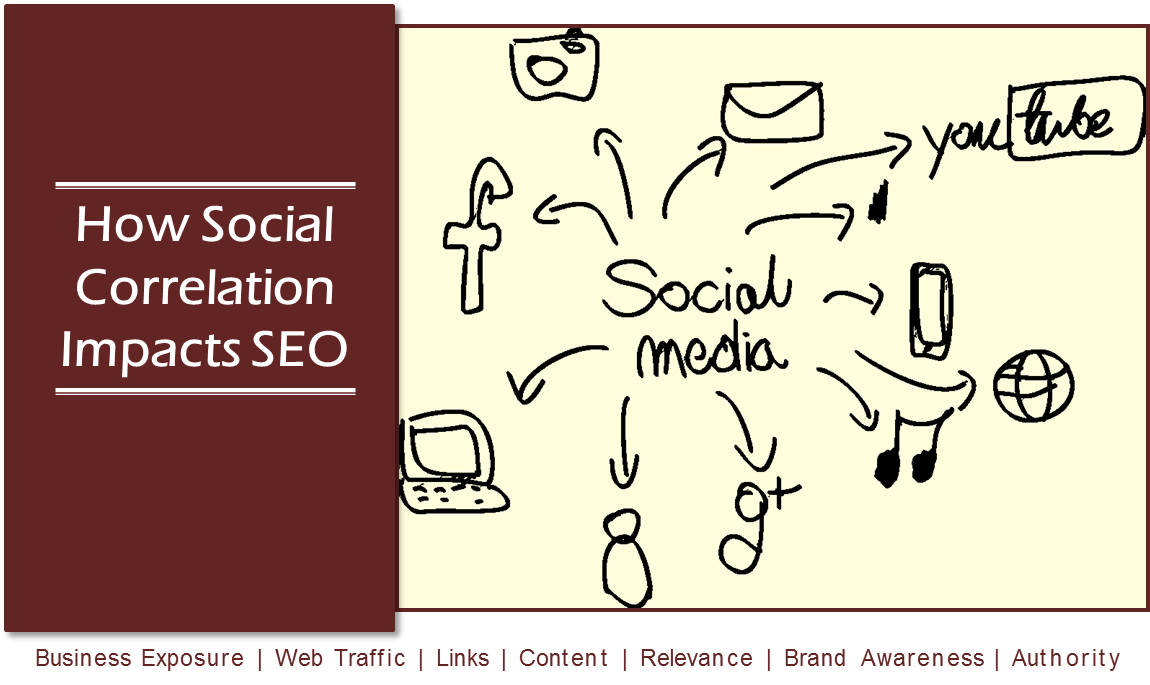
Many businesses jump on the social media bandwagon for no other reason than because someone told them they need to be doing it. While that may be true, it’s kind of like being told you should stop at the gas station but not knowing if it’s because you need to get gas, grab a quick snack, or use the restroom!
Maybe you understand that social media helps improve your rankings. But what does that mean? How does good social media correlate to increased search engine rankings?
Let’s take a look at a number of benefits of social media that feed directly into the ranking metrics that search engines use when ranking pages.
Social Media Provides Quick Indexing of Socialized Pages
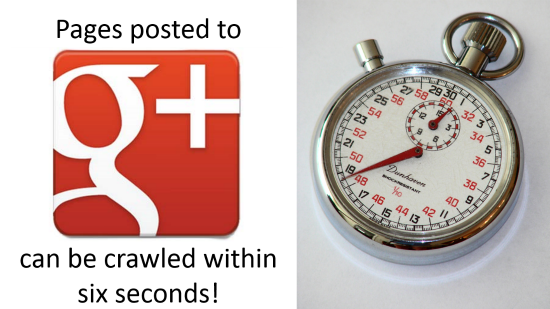
The search engines do a great job of monitoring the public feeds of the social sites. While the engines may not have all the access they want or need to sites like Twitter and Facebook, we do know that Google has unlimited access to it’s own Google+ network.
This means that pages and blog posts posted on Google+ enjoy quick indexing. In some cases, very quick indexing! Experiments have shown that Google has indexed pages within six seconds of being posted.
This is simply fantastic. Most new pages of a site have to wait until the search engine crawlers make their way back to the site, which can take days or weeks. Now, simply posting it on G+ about guarantees your pages will get indexed almost immediately.
While a page getting indexed doesn’t have any affect on the ranking algorithm, we know that pages not in the index simply cannot rank at all. So this pushes the ability of a page to get ranked up by a week or more. This is critical for algorithms that value fresh content. Having to wait a week or two for a new crawl automatically puts your new content at a severe ranking disadvantage.
Of course, larger sites already enjoy the benefits of near instant indexing. But not all of us enjoy the same, especially when new content isn’t being posted on a daily basis.
Social Media Grows Business Exposure
There is never anything wrong with getting in front of more people. Unless, of course, you’re blasting your content to a bunch of people that don’t give your content a second glance. But assuming that your content is valuable, social media allows you to reach an audience that is many multiples of the size of your own reach.
As you publish valuable content, many of your own social connections will like, share, tweet and comment on it. With each new share, your content is put in front of the audience of the person sharing it, getting it in front of even more eyeballs.
This is the type of exposure search engines love. After all, their goal is to rank pages that people want to see. If they can determine that your content is being shared a lot – that’s a signal that it might be content worth ranking, assuming they can figure out what to rank it for (that’s where good SEO comes into play.)
Social Media Increases Website Traffic

The more your content is shared via social networks, and the more eyeballs see those postings, the greater traffic you’ll experience. Each social share increases the likelihood that someone will click on the link. That traffic is gold.
While search engines don’t rank sites based on traffic alone, it is certainly a metric they want to understand. Why is any particular content getting so much traffic? Why are so many people visiting, and when they do, are they engaging in any way? This is all helpful information to search engines that analyze the value of any particular piece of content. More traffic can equate to more value in the algorithm’s eyes.
Social Media Helps Increase Links
One of the best values of social media, is that it opens the door to getting links to pages you might not otherwise have gotten. And guess what? Links are a very real search engine metric. While the links from the social posts themselves may not count in the algorithm, great content will earn natural links from other websites.
As visitors read your content and find it valuable, they may bookmark the page to revisit later. Those revisits might lead to a blog post about your content or the mention of your content as a reference in a blog post covering the same topic. The more links your content generates from valuable sources, the greater ranking opportunity it has.
Social Media Demonstrates Popularity of Content

The whole point of introducing links as a search engine ranking factor was to gauge the popularity of particular content. In basic terms, the more links a page gets the more popular it is and therefore the better it should rank. After all, search engines simply want to give people content they will find valuable.
While the actual link algorithm doesn’t work on a straight popularity line of 1 link = 1 vote, it’s still true that the more links you get the better your content will rank. And the more authority links you get (links from other trusted sources) the better.
Social media has proven to be one of the easiest way to get authority links to your content. While you can’t just post and expect the links to come, you can engage with your audience and massage that into some high quality links that algorithms rate highly.
Social Media Provides a Signal of Relevance
For the search engines, rankings are all about relevance. They look at how relevant your content is to a topic, to a particular keyword search and to the people searching. If it’s relevant, it ranks better (usually).
Social media activity can give the search engines signals of relevance by looking at who is sharing your content and what words they are using in the shares. If you posted using keywords, those keywords can reflect back to the post as being topically relevant. If your social circles are known to post or share content on a particular topic, that might give the search engines an additional indication that your post is relevant to a particular topic or field.
Social Media Builds Brand Awareness

Search engines love brands. And, to a degree, rightly so. Many companies have earned their position as a recognizable brand by being relevant to what people want. But you don’t have to be a major brand to benefit from building brand recognition. Small sites can build branding as well.
Think about what branding means. It’s just means doing what you do to the point that people recognize your name, whether they use your product or services or not. Every company has the opportunity to carve out some brand name recognition within their sphere… it just takes being awesome.
The more awesome you are the more likely you are to be noticed by the search engines for raking your content. Use social media to build up your brand by posting truly unique and great content the people love. They’ll learn your name and you’ll see your relevance continue to increase, both with your audience and the search engines.
Social Media Builds Authority
It’s been common knowledge that a site’s authority plays a pretty strong role in how individual pages rank. And the authority of any given page will work to increase the overall authority of the site itself.
The more “out there” you are in social media, engaging with your audience, posting quality content (not just your own!) and answering questions, the more your authority grows. Search engines pay attention to individuals and sites that have a growing or impressive authority in their industry, as that feeds back into the types of signals that they use to rank the value of any particular page.
Social Media Effects Personalized Results
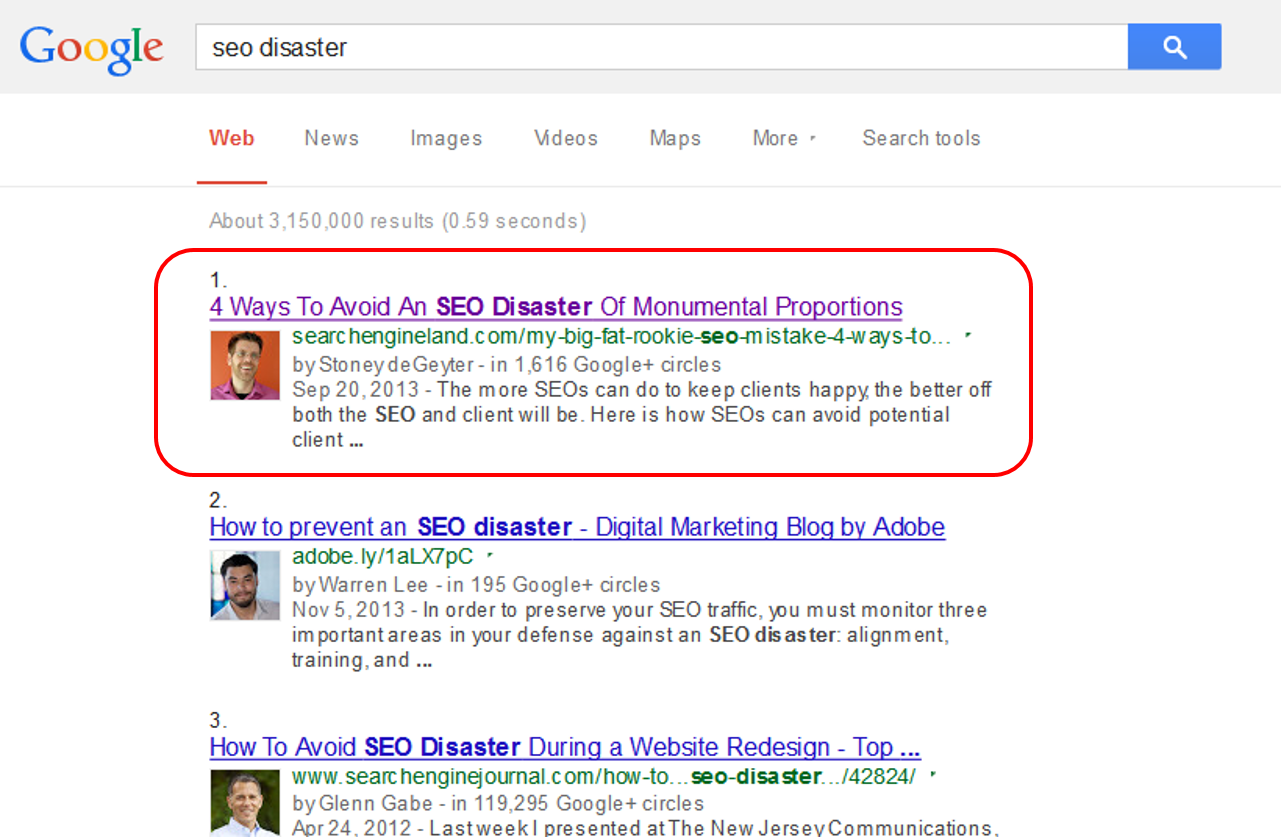
One of the other more direct benefits of social media is that it can have a very visible impact on your personalized search results. Google has a tendency to show sites that connections in your circle have shared. While these personal results don’t completely take over the otherwise organic results, social connections have a very strong influence in what pages Google will show you.
So while Google is doing that for you, it’s also doing that for other people you are connected with. They are more likely to see pages you’ve shared and posted due to that connection alone.
One thing to keep in mind, none of the signals above are direct signals the search engines use, other than the social connections. Social media generates links which affect rankings directly but the links from social posting don’t really count. But using social media provides value into each of these areas that the search engines do analyze. Using social media effectively gives the search engines solid clues that help them understand the value of any piece of content, which can work it’s way into the algorithmic assessment.
Where Does SEO Go From Here?
In light of all the correlating influence social media provides in regard to search engine rankings, where does that put SEO and the value of social media in the larger scale. Can SEO survive without social media? I don’t think so.
We’ve already seen a shift in what is necessary to do in order to market your site effectively to the search engines and earn top search engine rankings. In 2014, it looks something like this:
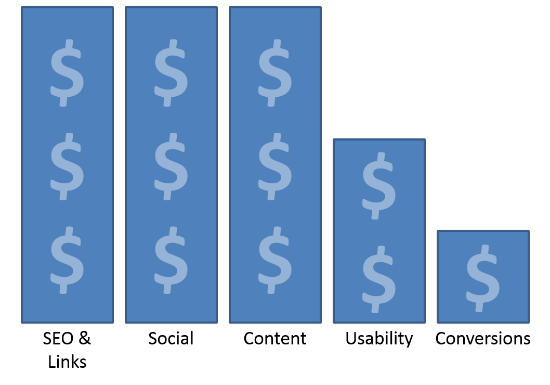
Having a well-rounded optimization effort means you have to include social media into those efforts. Of course, social media alone is about as valuable as links alone. It enhances one set of signals, but those signals alone are not enough. Today’s SEO needs to invest in content, usability and conversions along with on-page optimization, links and Social media.
But that’s just today. What about tomorrow? My guess is it might look a bit more like this:
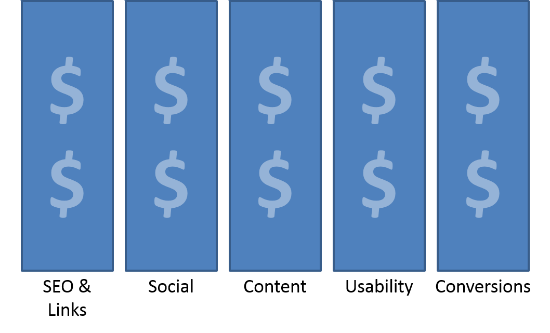
The more data the search engines can get a hold and use reliably, the more we’ll see these other factors grow in importance to good optimization. All of these metrics are important to the search engines in determining the value of any given site. They’d prefer not to rank a site, no matter how relevant, if conversions are scarce.
Relevance goes beyond keywords on the page, it also feeds into how visitors interact with your site. To be the most relevant you have to be great at giving visitors an onsite experience they love.
Unfortunately, too many businesses are stuck doing SEO circa 1999 and they continue to drop all their online marketing into SEO and links. Which poses the problem, if all your money is going to on-page SEO…
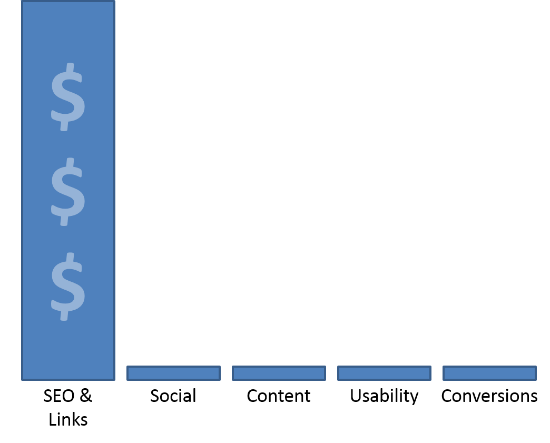
You won’t be keeping up with the algorithmic changes and and you’ll see your rankings do this…

Note: This presentation is part of a larger slide presentation, view the slides here.
